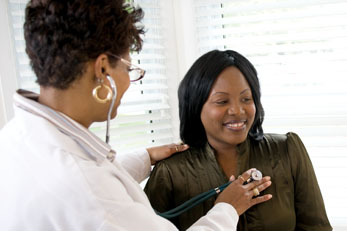Screenings help find a condition before you have symptoms
Screenings are tests or exams and they may be performed in the provider's office or at a different location where special equipment may be required. Screenings may help find diseases or conditions early, when they are easier to treat.
Breast Cancer Screenings*
Women 50 to 74 years of age should have biennial breast cancer screenings (or mammography). The decision to begin breast screenings earlier than age 50 should be decided by you and you provider. Women should also have breast exams done by their provider annually as well as regular self-exams at home. Breast cancer screenings can catch early signs of breast cancer to begin early treatment. Learn more
Cervical Cancer Screenings*
The Pap test is a simple test that checks for changes in the cervix. It detected early, chances of curing cervical cancer is very high. Cervical cancer screening (Pap test) and pelvic exam are encouraged for women between 21 to 65 years old every three years for Pap test who are sexually active and have a cervix. For women between the ages of 30 and 65 years old who want to lengthen the screening time, a Pap test every 5 years when combined with HPV testing. Learn more
Chlamydia and Other Sexually Transmitted Infections (STI)
Women aged 25 years old and younger should be tested for Chlamydia and other STIs in they are sexually active. Women aged 25 years and older should be tested who have a new sex partner or multiple sex partners. STIs can cause other health problems, make it hard to get pregnant and may affect your baby. Sexually active women should be tested for chlamydia and STIs with each health exam. Speak with your provider if you think you should be tested or treated for chlamydia or any other STI. Learn more
Colorectal Cancer Screenings
Women 50 to 75 years of age should be tested for colorectal cancer. If caught early, it is often treatable. There are several tests that can detect this cancer. The most common test known to many people is a colonoscopy. Learn more
Dental Exams
Every six months, schedule (and keep) your routine dental exam and cleaning appointment. Brush your teeth at least twice daily, preferably after every meal. Floss at least once per day.** Learn more
Bone Density Test
A bone density test determines whether you have osteoporosis or are at risk of osteoporosis. Osteoporosis is a disease that causes bones to become more fragile and more likely to break. A bone density test makes it possible to know your risk of breaking bones before it happens to you. A bone density test is recommended for women 65 years of age and older and for younger women at equal or greater risk for the disease. Talk to your provider about when and how often you should have a bone density test.
*U.S. Preventive Services Task Force
**Not a guarantee of plan benefit.
Which Screenings Are Right For You?


